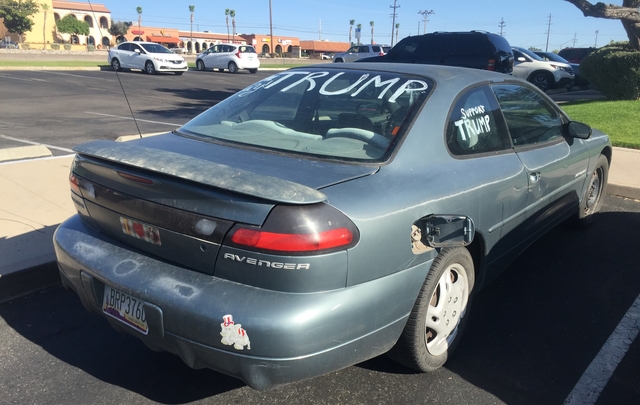It was easily the most beaten-up car in the parking lot. And that alone says a lot about how the United States is trending, since insurance companies and government regulations have made it harder and harder to keep older vehicles on the road. But what made it disturbingly poignant were the words scrawled on its windows, like the messages people write on newlyweds’ rides.
I’m always on the look-out for bumper stickers I can photograph for this feature, particularly in the run up to an election. But that’s proving more of a challenge lately. Many of the people driving new vehicles seem reluctant to identify themselves, as if they feared possible confrontations. The days when high-end SUVs sporting a large “W” decal swarmed the roads around here are long since past. Perhaps the dearth of political bumper stickers is also a reflection of the lack of enthusiasm that prospective voters have exhibited for most of the candidates.
It’s surely no accident that, even in the Republican-dominated suburbs where I spend most of my time behind the wheel, I still see more anti-Obama messages than anything in favor of a potential successor. And the people who have seemed most willing to show their support for a candidate by sporting official publicity are backers of Bernie Sanders.
There is another demographic, though, one I’ve been seeing more evidence of lately. It doesn’t consist of individuals who are organized in their advocacy. Nor does it include those who donate enough money to be courted by a political campaign. Rather, it encompasses people who feel the need to make a statement without knowing or caring how to do so in a “proper” manner, who pursue defiantly do-it-yourself forms of expression.
The car shown here is an excellent example. It’s not hard to imagine someone who worked on Mitt Romney’s 2012 presidential campaign shuddering at the prospect of him being supported in such a low-class, indiscreet manner. Hillary’s team would probably know better than to communicate outright distaste over such DIY messaging, but they aren’t really that interested in this kind of backing either. It falls, as pundits say, beneath the radar.
This is where Donald Trump is different and why, even now, he poses a bigger threat to establishment politics than Washington insiders are willing to acknowledge. It’s not that he sees himself in the sort of person who would write his name all over their vehicle. After all, Trump was born into a lot of money and has never tired of flaunting that privilege. What he sees, instead, is an aspiration to be a little more like him, to become “better” without worrying about the subtle social codes that are configured to prevent that improvement.
What Trump sees, in short, are people who will vote for him, despite the massive discrepancy between his wealth and theirs, because they see in him somebody who refuses to apologize for who he is and what he likes. Lack of discretion, a willingness to be derided for tastelessness, and sometimes sheer ignorance are all transmuted, by virtue of his P.T. Barnum-esque showmanship, into virtues that extend across the divides of wealth and privilege. For people who feel that they have are losing their ground, being pushed out of a secure class position into a frighteningly inchoate place of instability, this sacrifice can seem deeply meaningful.
That’s why the disgust and horror directed at Trump by and through the mainstream media continue to work to his advantage. Every time he says or does something that pundits insist that he shouldn’t have, that very insistence bolsters his support among those who are tired of being marginalized by rules of conduct of which they are only dimly aware at best. They believe him when he declares that he knows the rules — because of his childhood of privilege, the Ivy League education he regularly boasts about, the rarified circles in which he has moved as entrepreneur — yet breaks them anyway and also believe, more importantly, that he is, in a sense, breaking those rules for them.
Maybe this is why plenty of devout conservative Christians have warmed to Trump’s candidacy. It’s not simply that he purports to have found religion, though that matters to them, but that he has ingeniously managed to appropriate and repurpose a Christian logic of sacrifice. What he promises to save them from are not only the mounting pressures of living in a globalized economy, but the mockery, whether subtle or overt, to which they are subject when they express anxiety about their place in the world, fearful that they belong to a demographic that has already been written off as a loss. In other words, instead of dying for their failings, he offers to be laughed at for them.
In this sense, this car, the sort that would raise eyebrows at the country club or even church, is the perfect vehicle for Trump’s campaign, taking on the burden of mockery for others who are less willing or able to come out as a supporter of his xenophobic and proudly “tasteless” populism. When commentators worry about the ways in which his candidacy seems to be paralleling that of fascist strongmen of an earlier era, it is perhaps not his political ideology they are troubled by so much as this talent he has exhibited for performing the role of a seculiar savior. Honestly, it’s difficult to tell what Trump would advocate for if he were to win the White House, given the inconsistency of many of his statements — in sharp contrast to the discipline in messaging demonstrated by the Italian and German fascists after World War I — but it’s not nearly so hard to imagine his supporters enthusiastically embracing whatever he decides to do.
Photographs courtesy of the author







